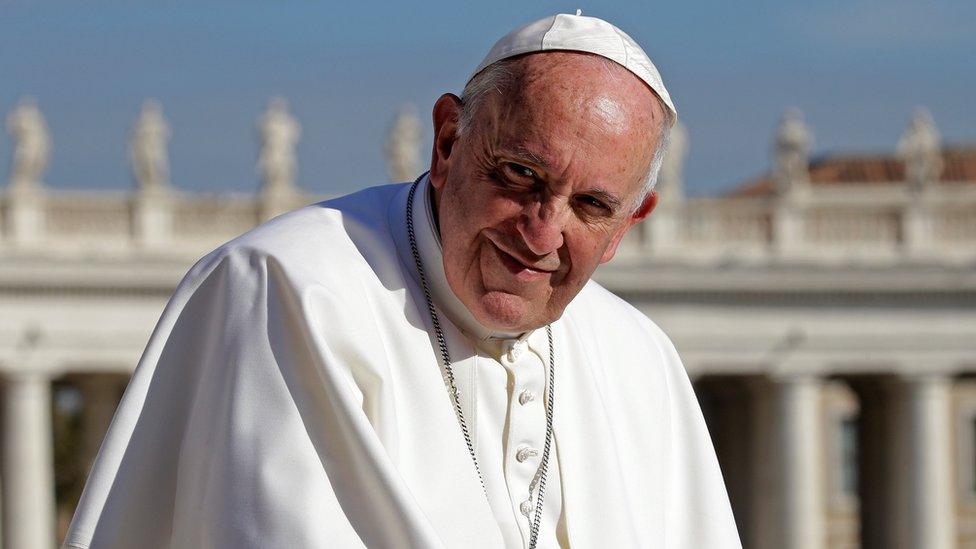Israeli, Palestinian press compete over papal visit
- Published
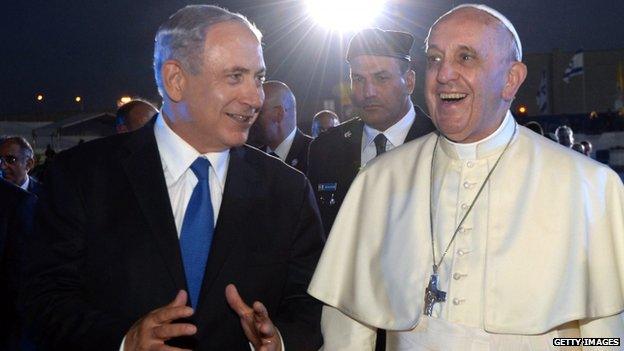
Pope Francis visited holy and politically symbolic sites on his two-day visit
Israeli and Palestinian papers appeared to be jostling to try and claim victory for their own side in their views of the Pope's visit to the Holy Land.
While some papers tried to score points on who was favoured more by the pontiff in his visits to holy sites and landmarks, others felt his tour would have no impact on the Middle East conflict.
Some editorials in the Palestinian press were positive about the visit, praising the Pope for what they saw as his recognition of a Palestinian state.
"The Pope blesses the establishment of a Palestinian state," pro-Fatah Al-Ayyam, external newspaper, declared.
It said that while some world leaders visited Israel before heading to Ramallah - the Palestinians' de facto administrative capital - the Pope began his journey in Ramallah first.
"That means avoiding entering Ramallah from the Israeli gate and airspace, underlining that he recognises Palestine and dealing with it as a [sovereign] state," Al-Ayyam said.
Another Palestinian paper also lauded the Pope for visiting the Israeli barrier separating Bethlehem in the West Bank from Jerusalem. Pro-Fatah Al-Quds, external said that his insistence on leaving his car and walking to the gate there to say a prayer was "a step with a unique significance".
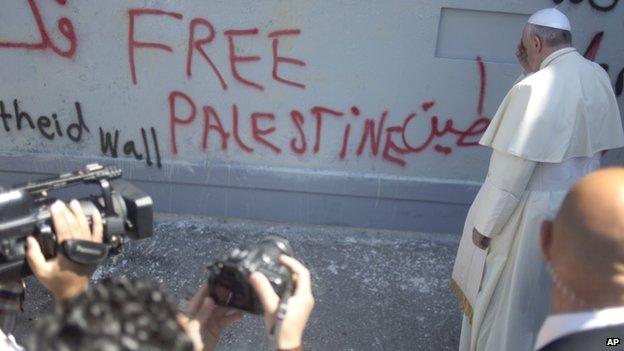
Pope Francis's visit to the West Bank barrier was a talking point in the press
The pro-Hamas Filastin, external newspaper however rejected the pontiff's visit outright. "The Pope's visit to the occupied Palestinian territories is mainly political," an editorial said, claiming that he conveyed the message of the US administration to the Palestinians. "Anyone who believes that the Church will oppose the Israeli occupier is wrong. The Church recognises the legitimacy of the entity which usurped Palestine and did not condemn the crime of the blockade of Gaza," it said.
But according to an editorial in the Palestinian Authority-owned newspaper Al-Hayat al-Jadidah, external, the Pope's visit came at a "crucial time" after great upheaval in the region.
"The Arab Spring created a state of fear and apprehension for many religious sects, particularly Christians, as Christian Arabs in Iraq and Syria have been the target of dubious Islamist groups," the paper said. "For this reason, the Pope's visit carries an important political and moral meaning in encouraging Palestinian and Arab Christians, in general, to remain in their homeland."
Tel Aviv visit 'overshadowed'
In the Israeli press, some commentators felt that the Palestinians had indeed scored a PR victory. "There is no doubt that the Pope gave the Palestinians tail wind in the PR battle they have been leading in recent months," Jack Khoury wrote in Israel's Haaretz, external daily.
Saying that the Pope's decision to fly directly from Jordan to Bethlehem without landing at Israel's Ben Gurion airport was being perceived by the Palestinians as recognition of sorts for an independent state, Khoury said that the pontiff's "most significant, most political step" was his decision to pray at the West Bank barrier.
"In a calculated decision, the Pope descended the vehicle taking him to the mass, stood in front of the fence and prayed... No-one heard the prayer, but it is clear that his attitude to it was not positive and within minutes his picture praying in front of the fence starred in news sites all over the world..."
Ben Hartman in the Jerusalem Post, external agreed that photographs of the Pope praying at the barrier overshadowed his visit to Tel Aviv. "Pictures had already circulated the globe of the pope only minutes earlier praying at the West Bank security barrier, his head bowed in prayer, surrounded on both sides by graffiti reading 'Free Palestine' and 'Bethlehem looks like Warsaw Ghetto.' A shot like that is hard to compete with."
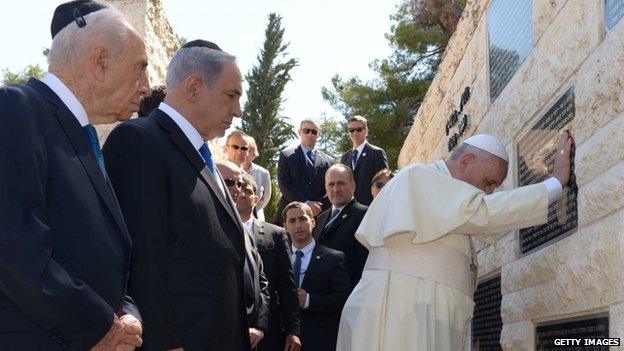
Pope Francis visited a memorial to Israelis killed by Palestinian militants, on Mount Herzl, in Jerusalem
However an editorial in the Jerusalem Post conceded that the Pope had tried to be even-handed. "In what can be seen as an attempt to balance the impression made by his silent prayer at the security barrier outside Bethlehem, Francis also made an unplanned visit to a memorial to Israeli terrorism victims on Mount Herzl," it said.
"Showing empathy for one side risked offending the other side. Too neutral a message would be seen as bland… These nearly insurmountable challenges were met by Francis with grace and charm."
But while Reuven Berko in Yisrael Hayom, external said that the Pope's meetings with the Israeli president and prime minister were "de facto expressions of the Vatican's recognition of Jerusalem as capital of Israel", Noah Klieger in Yediot Aharonot, external was disappointed. "The statements of Francis at this impressive, touching memorial [to victims of terrorism] in the Jerusalem mountains were undoubtedly sincere and came from genuine pain. It's just a pity they will contribute nothing to the struggle against the spread of anti-Semitism in the world."
BBC Monitoring, external reports and analyses news from TV, radio, web and print media around the world. For more reports from BBC Monitoring, click here. You can follow BBC Monitoring on Twitter , externaland Facebook, external.
- Published26 May 2014
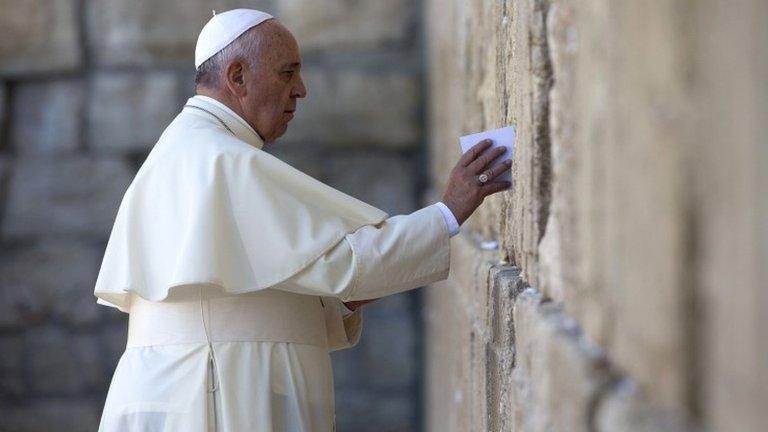
- Published28 October 2022
